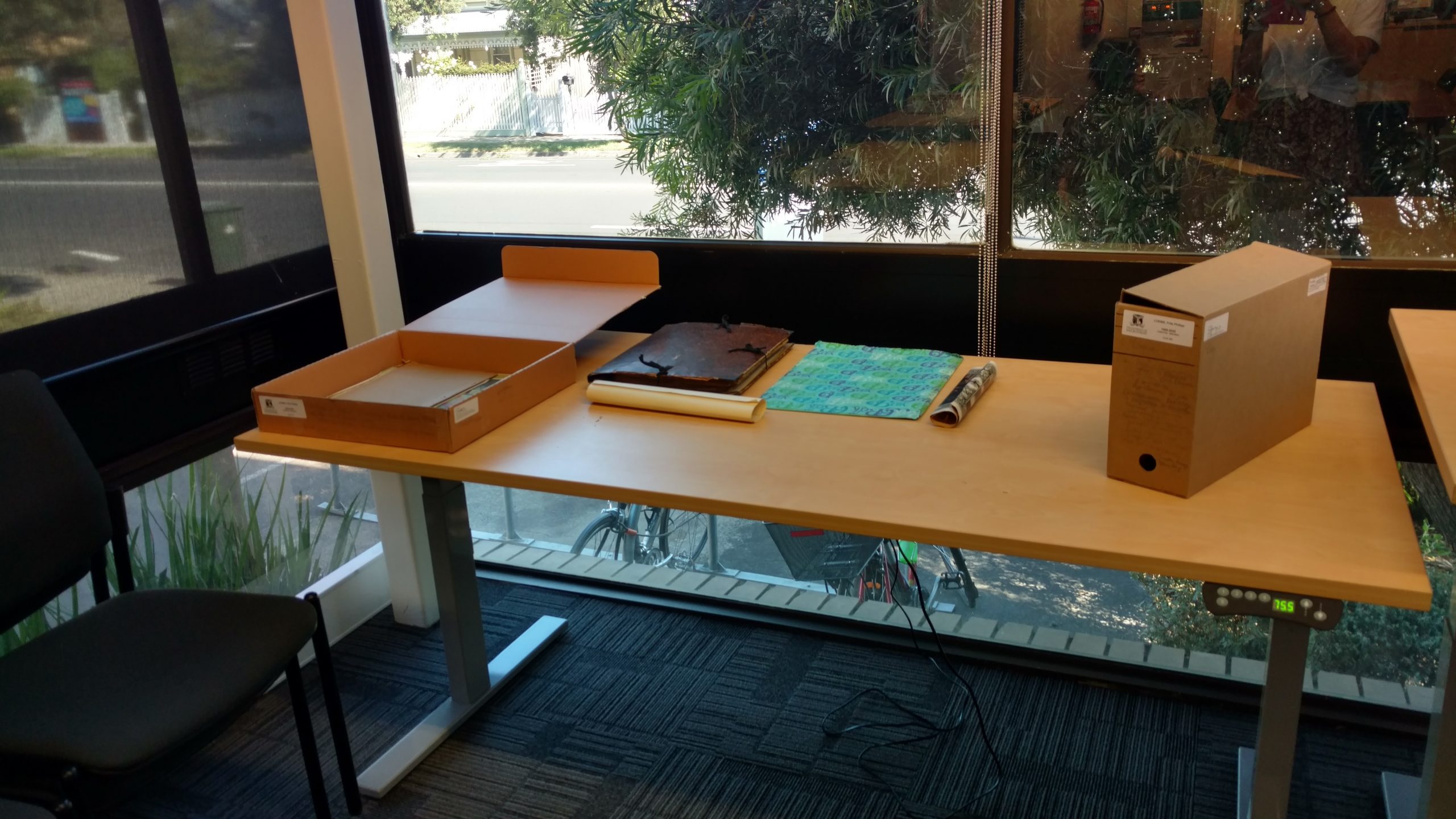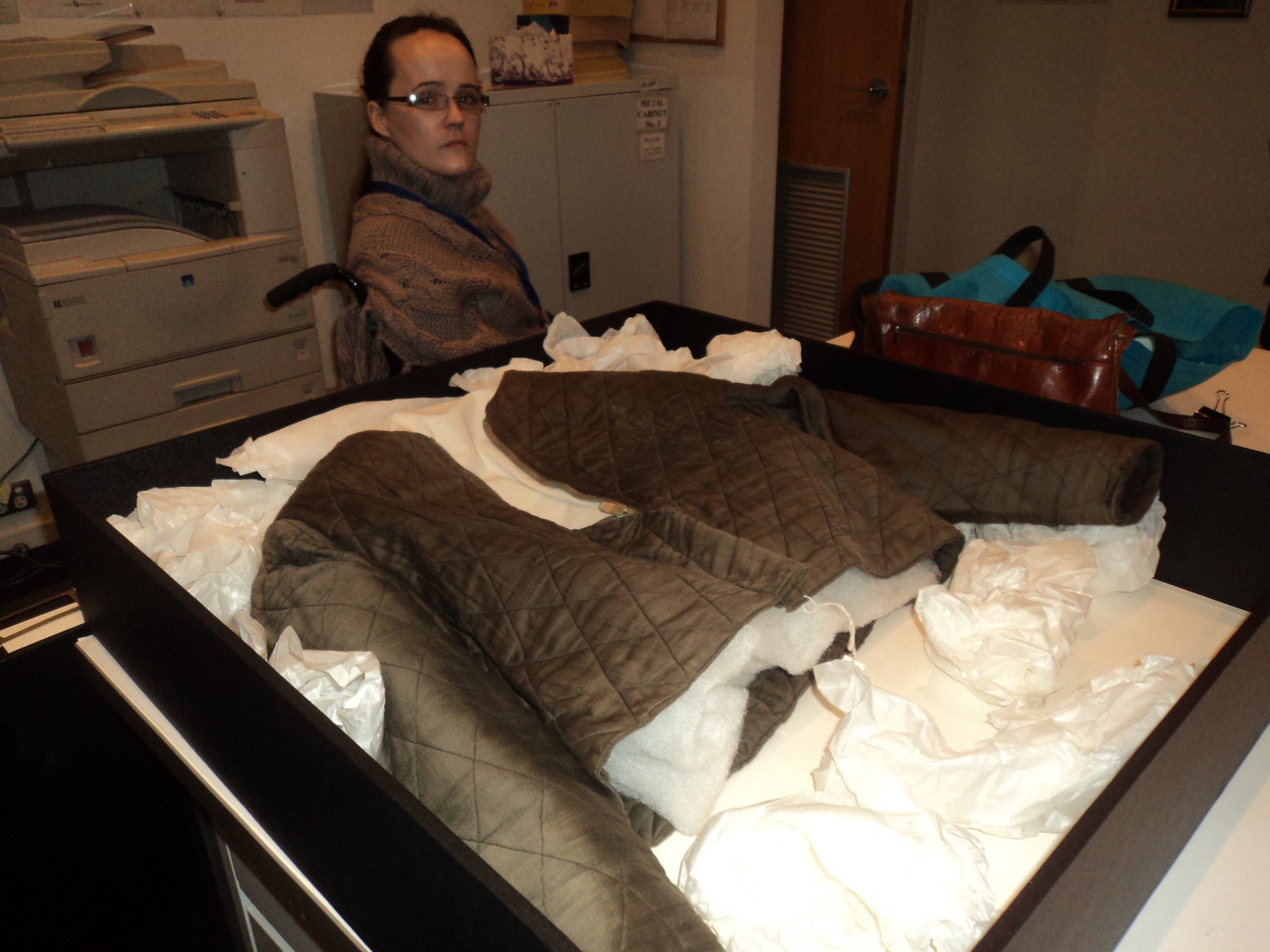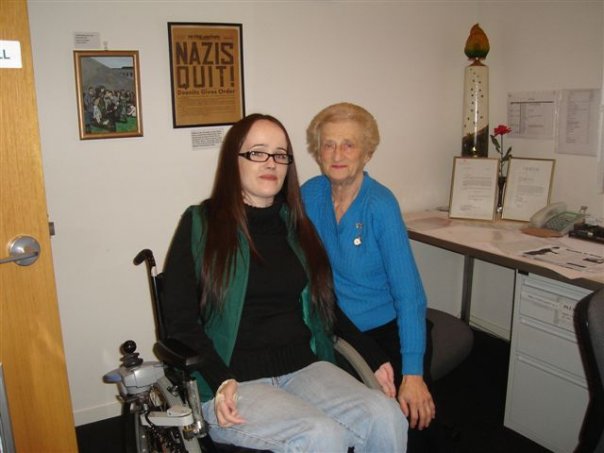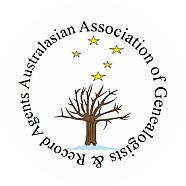Photo’s:
01 Fritz Philipp Loewe Collection, University of Melbourne Archives (UMA)
Rachel examined this collection to locate and copy documents relevant to an overseas client. This project marked her first international commission as an accredited genealogist, with the client engaging her through the AAGRA member directory.
02 Ursula Flicker Archival Collection, Melbourne Holocaust Museum
Rachel examined a winter coat belonging to a concentration camp inmate that contained secret pockets holding German-language documents. She translated the material as part of her work in the archives.
03 Melbourne Holocaust Museum Archives
Rachel with her mentor, Ursula Flicker OAM, in the archives of the Melbourne Holocaust Museum. This is where Rachel first learned the craft of cataloguing, an essential skill for any genealogist. This experience counted towards her AAGRA application in the ‘thorough understanding of sources’ and ‘careful handling of original documents’ sections.
By Rachel Croucher
Vice President, Australasian Association of Genealogists and Record Agents
“My credentials will be my brand…”
The growing popularity of genealogy as a profession underscores the importance of accreditation as a badge to distinguish professionals from hobbyists and pretenders. While passion drives many of us, professionalism requires recognised standards. As I worked to turn my passion for genealogy into a profession (registering an ABN and business name, building a website, identifying services and prices, formulating contracts, etc) a friend who works in a senior business marketing role asked what my business name and brand would be. I replied without thinking: “I haven’t got a business name yet, but my credentials will be my brand.”
I had credentials aplenty, but were they the right ones? A lifelong passion for genealogy? Check. A bachelor’s degree with majors in German linguistics and history? Check. A master’s degree in history with a research component? Check. Eight years’ experience translating documents from German into English in the archives of the Melbourne Holocaust Museum? Check. Enrolment in the Diploma of Family History at the University of Tasmania? Check. An addiction to genealogy Facebook groups? Check.
Nevertheless, I had a gnawing feeling after reading Elizabeth Shown Mills’ Professional Genealogy back-to-back and researching the standards of the Association of Genealogists and Researchers in Archives (AGRA), Board for Certification of Genealogists (BCG), and International Commission for the Accreditation of Professional Genealogists (ICAPGen), that I needed something more to distinguish myself from everyone else on the Internet with a website and database subscription calling themselves a genealogist.(1) My clients needed to know they were getting the real deal with me. With only a small private client base consisting of friends, distant family, and a handful of friends of friends, I was determined to obtain membership of the Australasian Association of Genealogists and Record Agents (AAGRA) before launching my services to the public.
Professional standards and credibility are key to building client trust, and accreditation affirms recognised benchmarks for research quality and ethics. BCG emphasises that certification in every profession serves as a seal of confidence for careful consumers and indicates that a practitioner has met the fields rigorous standards for knowledge and competence, and that genealogy is no different.(2) In Australia, professional genealogists and record agents should have skills, experience, and knowledge in various areas. Noting that AAGRA’s membership criteria also reflected the essential skills required for the practice of genealogy, I set about memorising and perfecting them before submitting my application.(3)
The AAGRA application process is no walk in the park, nor should it be. During the time I spent compiling and perfecting my submission, I learned more about what a genealogist ought to be than at any other point in my professional career. It took eight months to put my application portfolio together for admission to the genealogist category, for which the mandatory requirements are business skills, good English expression, thorough understanding of sources, careful handling of original documents, appropriate use of sources, correct analysis of information, lateral range of sources, accepted genealogical charting, and a high standard of manuscript preparation.(4) I remember thinking the evidence required to substantiate my competence in these standards was brutal, but after nearly a decade of professional practice, I understand now more than ever that these requirements are essential to build public trust in genealogy as a profession and to enhance ethical practice in the industry.
Accreditation is more than just a credential. It is an ongoing commitment to excellence and ethics for one’s clients and peers. Professional standards not only elevate genealogy as a field, but they also show we are not an obscure hobby; we are a distinct, legitimate profession deserving of recognition and respect.
Rachel Croucher will be a panellist at the ‘Pathways to Professional Genealogy’ online conference hosted on 25 October 2025 by the Society of Australian Genealogists (SAG). You can register for the event at the SAG website here: https://sag.org.au/event-6301541
(1) Association of Genealogists and Researchers in Archives (AGRA) <https://www.agra.org.uk/join-member-notes>, ‘Become a Board-Certified Genealogist’ Board for Certification of Genealogists (BCG) <https://bcgcertification.org/become-a-certified-genealogist>, International Commission for the Accreditation of Professional Genealogists (ICAPGen) <https://icapgen.org/become-accredited/>, Elizabeth Shown Mills (ed), Professional Genealogy: Preparation, Practice & Standards (Genealogical Publishing Company, Inc 2018)
(2) Board for Certification of Genealogists <https://bcgcertification.org/become-a-certified-genealogist>
(3) Rachel Croucher, ‘How to Become a Professional Genealogist or Record Agent in Australia’, Australasian Association of Genealogists and Record Agents (1 March 2024) <https://www.aagra.asn.au/how-to-become-a-professional-genealogist-or-record-agent-in-australia/>
(4) ‘Join AAGRA’, Australasian Association of Genealogists and Record Agents <https://www.aagra.asn.au/join-aagra/>



